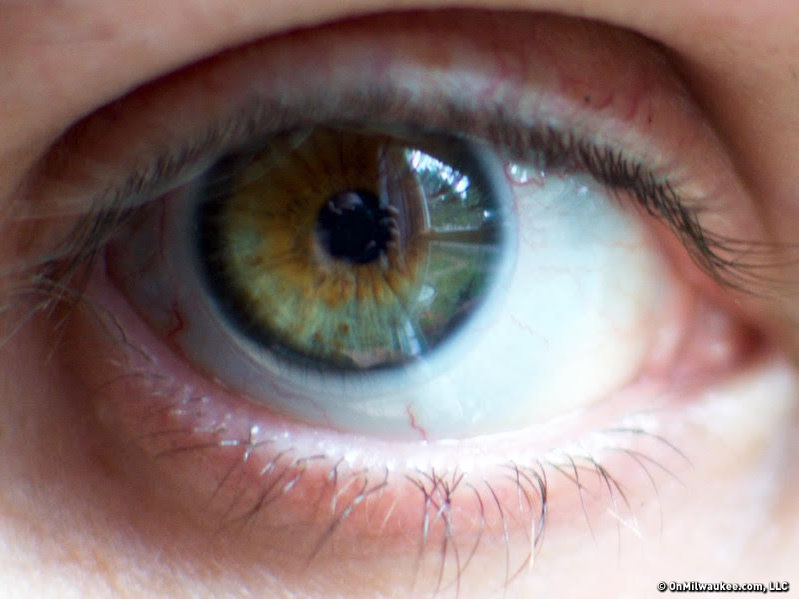There are a lot of questions revolving around Monday’s eclipse and eye safety. OnMilwaukee tracked down Dr. Thomas B. Connor, Jr., professor of ophthalmology at Froedtert & the Medical College of Wisconsin Eye Institute, to get all the deets on how to experience the phenomenon without injury.
"A solar eclipse is a wonderful natural marvel, but just like watching a lightning storm or looking down a waterfall or at bison and bear at Yellowstone, it should be done safely," says Connor.
OnMilwaukee: Is it safe to make your own eclipse glasses?
Dr. Thomas Connor: No. First of all, it is never safe to look directly at the sun, even during an event such as the partial eclipse that will be visible from Milwaukee on August 21, without proper protective eyewear. Staring at the sun for even a short time without wearing the right eye protection can damage the retina and cause temporary or even permanent vision loss called solar retinopathy.
Special-purpose solar filter glasses must be used. These solar filters are used in "eclipse glasses" or in hand-held solar viewers. They must meet a specific worldwide standard known as ISO 12312-2. Ordinary sunglasses, even very dark ones or stacking multiple pairs, or homemade filters are not safe for looking at the sun. If the glasses you have are scratched or cracked, don’t use them.
If you do not have access to a pair of eclipse glasses or another type of safe solar filter, you can still view the eclipse indirectly by projecting an image of the sun onto the ground with a "pinhole camera." This is the only safe type of DIY eclipse viewer because you keep your back to the sun while using it. You can find tutorials on how to make them on reputable astronomy websites, like this one.
With the proper protection, how long can a person look at the eclipse?
As long as you have the proper eye protection, you can look at the sun safely for as long as you’d like. But it is important to remember to put your eclipse glasses on before you look at the sun and only remove them when you’ve completely focused your gaze elsewhere.
What exactly happens to the eyes if people look at an eclipse without proper filtration and is it curable?
The damage from solar retinopathy can occur without any pain, and the visual effects can take hours to become noticeable – well after the damage is done. Recovery from solar retinopathy can take several months, depending on the extent of the damage. If the damage is more severe and extends to the center of the retina (the macula), there may be permanent vision loss.
For anyone observing the eclipse in Wisconsin, there is no place where it is safe to remove your solar viewer/glasses to look at the eclipse without protection.
Are there different rules for kids? Is it safe for very small children?
While there are no special rules for kids, children do require careful supervision. If you take your child out to look at the eclipse, keep your eyes on them, not the sun, so you can be sure they keep their glasses on. To be extra safe, you can also focus their attention with their back to the sun by using a homemade "pinhole camera."
Dr. Connor’s safety viewing tips:
- Carefully look at your solar filter or eclipse glasses to make sure they are in good condition before using them. When you have them on, you should really only be able to see the sun.
- Always read and follow all directions that come with the solar filter or eclipse glasses.
- Before looking up at the sun, cover your eyes with your eclipse glasses or solar viewer. After glancing at the sun, turn away and remove your filter – do not remove it while looking at the sun.
- Never look at the uneclipsed or partially eclipsed sun through an unfiltered camera, telescope, binoculars or other similar devices, not even if you are wearing eclipse glasses or holding a solar viewer at the same time. The intense solar rays coming through these devices will damage the solar filter and your eyes. Instead, the device requires its own solar filter.
Read more about Monday's eclipse, including: where to watch it, which celestial snacks to eat and how to get some viewing glasses.
Molly Snyder started writing and publishing her work at the age 10, when her community newspaper printed her poem, "The Unicorn.” Since then, she's expanded beyond the subject of mythical creatures and written in many different mediums but, nearest and dearest to her heart, thousands of articles for OnMilwaukee.
Molly is a regular contributor to FOX6 News and numerous radio stations as well as the co-host of "Dandelions: A Podcast For Women.” She's received five Milwaukee Press Club Awards, served as the Pfister Narrator and is the Wisconsin State Fair’s Celebrity Cream Puff Eating Champion of 2019.




